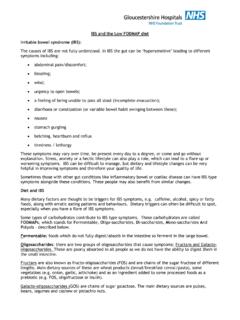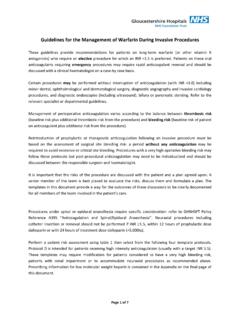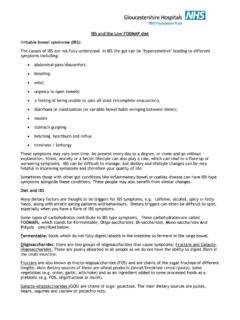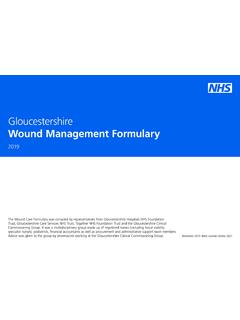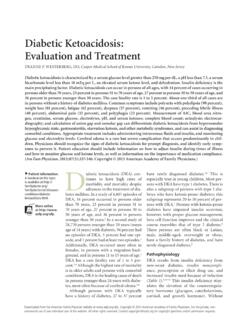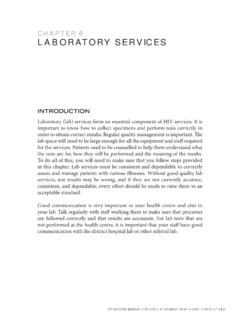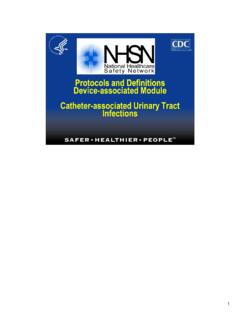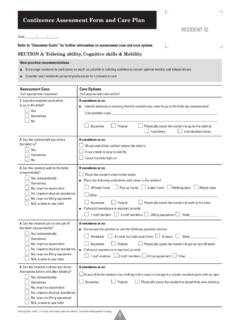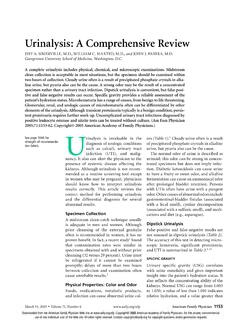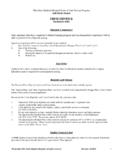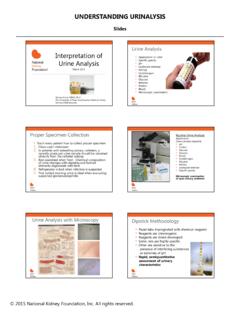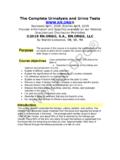Transcription of ANTIMICROBIAL GUIDELINES NOVEMBER 2019 URINARY …
1 Gloucestershire Health and Care NHS Trust UTI GUIDELINES Page 1 For review NOVEMBER 2020 ANTIMICROBIAL GUIDELINES NOVEMBER 2019 URINARY TRACT INFECTIONS This section covers Lower URINARY tract infections Acute pyelonephritis Recurrent URINARY tract infections Acute prostatitis Catheter associated URINARY tract infections Start Smart then Focus A Start Smart - then Focus approach is recommended for all antibiotic prescriptions. Start Smart then Focus Treatment Algorithm Fluoroquinolone antibiotics: In March 2019, the MHRA issued restrictions and precautions for the use of Gloucestershire Health and Care NHS Trust UTI GUIDELINES Page 2 For review NOVEMBER 2020 fluoroquinolone antibiotics because of rare reports of disabling and potentially long-lasting or irreversible side effects (see Drug Safety Update for details).
2 NICE is currently reviewing recommendations relating to fluoroquinolone antibiotics. IMPORTANT Fluoroquinolone Antibiotics (MHRA March 2019) Systemic (by mouth, injection, or inhalation) fluoroquinolones (Ciprofloxacin, Levofloxacin, Moxifloxacin, Ofloxacin) can very rarely cause long-lasting (up to months or years), disabling, and potentially irreversible side effects, sometimes affecting multiple systems, organ classes, and senses Consideration should be given to official guidance on the appropriate use of antibacterial agents. The new EU restrictions closely align with existing UK national guidance.
3 The restrictions should not prevent use of a fluoroquinolone for serious or severe infections if this is consistent with UK national guidance or where there are microbiological grounds, and where the benefit is thought to outweigh the risk. If you have any queries on choice of antibiotic please consult a microbiologist Version Change Detail Date 1 Put in place for new organisation NOVEMBER 19 For review NOVEMBER 2020 Based on NICE summary of ANTIMICROBIAL prescribing guidance managing common infections Authors Dr Philippa Moore, Consultant Medical Microbiologist, Gloucestershire Hospitals NHS Foundation Trust Laura Bucknell, Head of Medicines Optimisation.
4 Gloucestershire Health and Care NHS Foundation Trust Gloucestershire Health and Care NHS Trust UTI GUIDELINES Page 3 For review NOVEMBER 2020 PHE quick reference guides Flowchart 1 For women under 65 years with suspected UTI. Excludes women with recurrent UTI (2 episodes in last 6 months or 3 episodes in last 12 months) and URINARY catheter Flowchart 2 For infants/children under 16 years with suspected UTI Flowchart 3 For adults over 65 years of age with suspected UTI (with or without catheter)
5 Gloucestershire Health and Care NHS Trust UTI GUIDELINES Page 4 For review NOVEMBER 2020 THINK SEPSIS - check for signs/symptoms using local/national tool such as NICE, RCGP or NEWS2 check for any new signs/symptoms of pyelonephritis *see box below FLOWCHART 1: URINARY signs/symptoms in WOMEN under 65 years Do not treat asymptomatic bacteriuria in non-pregnant women as it does not reduce mortality or morbidity Follow relevant diagnostic guide and safety-netting Consider pyelonephritis or suspected sepsis: send urine for culture immediately start antibiotic/management for upper UTI/sepsis using NICE/PHE guideline on pyelonephritis.
6 ANTIMICROBIAL prescribing or local/national GUIDELINES for sepsis refer if signs or symptoms of serious illness or condition Review time of specimen (morning is most reliable) Send urine for culture to confirm diagnosis Consider immediate or back-up antibiotic (if not pregnant) depending on symptom severity using NICE/PHE guideline on lower UTI: ANTIMICROBIAL prescribing Send urine culture if risk of antibiotic resistance If not pregnant and mild symptoms, watch & wait with back-up antibiotic OR Consider immediate antibiotic using NICE/PHE guideline on lower UTI: ANTIMICROBIAL prescribing NO POSITIVE nitrite OR leukocyte and RBC POSITIVE YES YES YES NEGATIVE for ALL nitrite, leukocyte, RBC YES YES YES NO YES First exclude vaginal and urethral causes of URINARY symptoms: vaginal discharge: 80% do not have UTI urethritis - inflammation post sexual intercourse, irritants check sexual history to exclude sexually transmitted infections genitourinary syndrome of menopause (vulvovaginal atrophy) UTI likely No urine culture Reassure that UTI less likely Consider other diagnosis UTI equally likely to other diagnosis UTI LESS likely YES ALL PATIENTS.
7 Share self-care and safety-netting advice using TARGET UTI leaflet If pregnant always send urine culture follow national treatment GUIDELINES if any bacteriuria *Signs of pyelonephritis: kidney pain/tenderness in back under ribs new/different myalgia, flu like illness shaking chills (rigors) or temperature C or above nausea/vomiting YES NO Key: UTI symptom Suspected sepsis alert Other advice Action advised Perform Urine dipstick Test NEGATIVE nitrite POSITIVE leukocyte Does patient have any of 3 key diagnostic signs/symptoms? dysuria (burning pain when passing urine) new nocturia (passing urine more often than usual at night) urine cloudy to the naked eye 2 or 3 symptoms 1 symptom no Are there other URINARY symptoms that are severe?
8 Urgency visible haematuria frequency suprapubic tenderness Gloucestershire Health and Care NHS Trust UTI GUIDELINES Page 5 For review NOVEMBER 2020 FLOWCHART 2 for infants/children under 16 years with suspected UTI Consider UTI in any sick child and every young child with unexplained fever Key: Urgent alert UTI signs/symptoms Action advised Other advice Consider referral to a paediatric specialist Test urine within 24 hours If urine test positive, treat with antibiotic using NICE/PHE guideline on pyelonephritis: ANTIMICROBIAL prescribing Check temperature and symptoms in all infants/children unexplained fever 38oC or more OR loin pain/ tenderness suggesting pyelonephritis Management depends on age and symptoms Refer urgently to paediatric specialist care AND send a urine sample for urgent microscopy and culture Infant or child over 3 months with suspected UTI.
9 Most common symptoms: fever, frequency, dysuria, abdominal pain, loin tenderness, vomiting, poor feeding, dysfunctional voiding, changes to continence Less common: lethargy, irritability, haematuria, offensive urine, failure to thrive, malaise, cloudy urine POSITIVE nitrite AND POSITIVE leucocyte POSITIVE nitrite NEGATIVE leucocyte NEGATIVE nitrite POSITIVE leucocyte NEGATIVE nitrite AND NEGATIVE leucocyte Treat as UTI AND start antibiotic Send urine for culture if: under 3 years suspected pyelonephritis risk of serious illness past UTI no response to treatment and urine sample not already sent Treat as UTI AND start antibiotic if dipstick on fresh urine sample Send urine for culture to confirm diagnosis and reassess with result Repeat urine if not fresh (as old samples can give false positives) Send urine for culture Under 3 years: start antibiotic and reassess with culture result Over 3 years: only start antibiotics if good clinical evidence of UTI.
10 Leucocytes may indicate infection outside URINARY tract UTI unlikely Do not start antibiotics Exclude other causes Send urine for culture if: suspected pyelonephritis risk of serious illness under 3 months recurrent UTI no response to treatment within 24-48 hours and urine sample not sent symptoms and dipsticks results do not correlate Infants younger than 3 months: Most common symptoms: fever, vomiting, lethargy, irritability, poor feeding, failure to thrive Less common: abdominal pain, jaundice, haematuria, offensive urine YES NO In ALL follow NICE/PHE guideline on lower UTI: ANTIMICROBIAL prescribing, safety-net and give self-care advice: advise carer to bring the infant or child for reassessment if the infant or child is not improved or worse after 24 48 hours Perform a urine dipstick test Refer to NICE CG54 for other things to consider in suspected UTI in children For treatment refer to joint NICE/PHE guidance: NICE/PHE GUIDELINES on UTI (lower): ANTIMICROBIAL prescribing or NICE/PHE GUIDELINES on pyelonephritis (acute): ANTIMICROBIAL prescribing Gloucestershire



